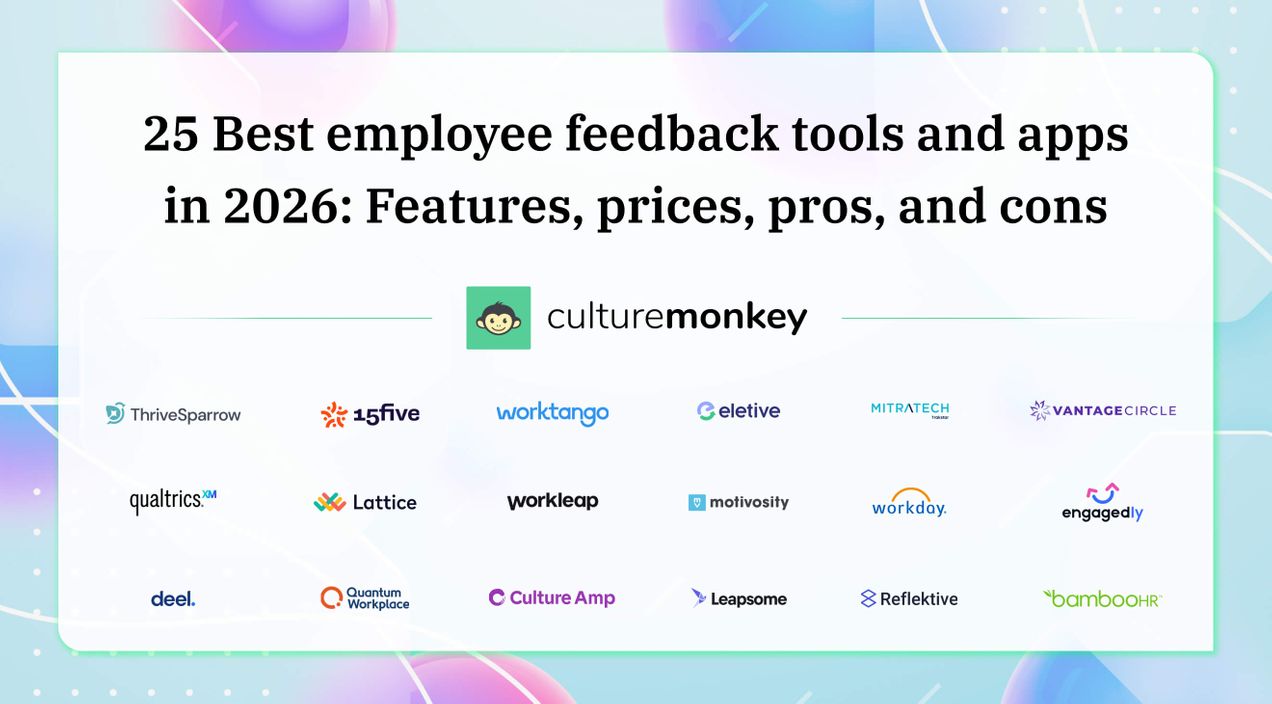Why UAE HR leaders are switching to AI feedback platforms in 2025 and beyond

Every morning, the train station becomes a stage. A blur of briefcases, hurried footsteps, and half-drunk coffees. Everyone’s chasing somewhere, but the choreography? It's missing. A late announcement here, a wrong platform there, and suddenly, motion turns into mayhem.
But imagine if the station could speak; whisper directions, nudge choices, anticipate mistakes before they happen. The same people, the same rush, but now moving with purpose and precision.
That’s what timely insight does; not by shouting orders, but by guiding gently, exactly when it matters. In the workplace, too, it’s not about more control. It’s about smarter signals. Because of clarity in the chaos? That’s where true momentum begins.
TL;DR
What are AI-powered employee feedback platforms?

TL;DR
AI feedback platforms automate and elevate employee sentiment tracking using NLP, real-time analytics, and smart surveys. They interpret tone, emotional context, and patterns—not just responses—making feedback meaningful.
Unlike static tools, they integrate with Slack or Teams, analyze trends instantly, and suggest action steps for managers, turning anonymous feedback into strategy—especially critical in agile, high-growth UAE workplaces.
AI-powered employee experience feedback platforms are modern systems that use artificial intelligence to collect, analyze, and act on employee sentiment in real time. Unlike traditional survey tools, these platforms don’t just gather responses—they interpret tone, context, and patterns to analyze employee feedback and uncover insights that HR teams can actually use.
At their core, these platforms automate the feedback cycle. They send timely questions (often in the form of pulse surveys or conversational check-ins), analyze the responses using natural language processing (NLP), and surface trends around engagement, satisfaction, burnout, and more. Some platforms can even detect emotional undertones or suggest next steps based on historical data.
What makes them different is their ability to go beyond static dashboards. AI feedback platforms UAE companies now use are built to analyze HR data and keep pace with fast-evolving workplaces. They prioritize real-time analytics, customizable reports, and intelligent nudges for managers, turning feedback into strategy, not just noise, giving companies a competitive edge.
And for employees? These systems make it easy to give honest input—often anonymously and effortlessly—through platforms they already use for employee onboarding, like Slack, Teams, or email.
The evolving HR landscape in the UAE: Why change is happening now

HR in the UAE isn’t just adapting to workforce planning; it’s transforming. Between shifting workforce expectations, national talent goals, and a race toward digitalization, the traditional HR playbook is getting a serious rewrite.
Here’s why UAE HR leaders are embracing new strategies for a diverse workforce, fast:
A younger, digitally fluent workforce
Millennials and Gen Z now make up a large chunk of the UAE’s labor force, highlighting the importance of talent acquisition. These employees expect feedback related to job satisfaction to be continuous, relevant, and two-way. Static surveys or yearly reviews just don’t cut it anymore, prompting companies to adopt AI feedback platforms that support talent management and are actually wanted by UAE employees to engage with.
Government pressure for Emiratization
With stronger mandates around Emiratization, HR leaders are rethinking how to attract, engage, and retain local talent. AI-driven systems help align HR management feedback collection with Emiratization HR strategy goals, identifying inclusion gaps and tracking progress toward national hiring benchmarks.
Growth of hybrid and remote work models
Post-pandemic, UAE firms are managing dispersed teams more than ever before. Real-time, AI-driven employee feedback software that UAE companies now use makes it easier to track sentiment and engagement across time zones and office setups—without micromanagement and fostering internal mobility.
Rising employee turnover rates
Retention is a growing challenge, especially in tech and services. By switching to AI, HR teams can reduce administrative tasks while detecting early warning signs of disengagement and proactively improve employee development and retention UAE-wide before talent walks out the door.
Surge in enterprise HR tech investments
As digital transformation becomes a boardroom priority, HR is no longer left behind. Enterprise HR softwarein UAE companies now prioritize AI feedback tools that integrate with existing systems and bring people insights directly into leadership conversations.
Traditional surveys vs. AI feedback tools: What’s the difference?

Traditional surveys had their time, but let’s be honest, they weren’t built for today’s fast-moving, feedback-hungry workplaces. AI feedback tools, on the other hand, are designed to deliver smarter insights with less lag and more context.
Here's a side-by-side breakdown of how they compare across t key aspects, as AI technology continues to advance.
| Aspect | Traditional Surveys | AI Feedback Tools |
|---|---|---|
| Frequency | Often annual or quarterly | Continuous (weekly, monthly, or even real-time) |
| Data Analysis | Manual or basic analytics | AI-driven sentiment analysis and trend detection |
| Employee Participation | Lower response rates due to length and effort | Higher engagement with shorter, conversational formats |
| Response Interpretation | Surface-level stats (e.g., scores, averages) | Deep context—tone, emotion, and patterns extracted |
| Actionability | Requires manual follow-up and analysis | Instant insights with suggested actions for managers |
| Anonymity & Trust | Often unclear or mistrusted in Gulf workplaces | Stronger anonymous feedback, UAE employees feel safer using |
| Integration | Siloed, standalone tools | Seamlessly plugs into HR tech in UAE firms and workflows |
Key challenges HR leaders face in UAE enterprises

UAE HR leaders are navigating a uniquely complex talent landscape, where rapid growth, cultural nuance, and regulatory shifts collide. Traditional methods no longer offer the agility or depth needed, allowing HR professionals to explore new avenues. Here are seven challenges pressing on HR teams across the Emirates:
- Balancing nationalization with diversity: Striking the right balance between meeting Emiratization HR strategy goals and maintaining a globally diverse team is no small feat. Many HR leaders are tasked with designing inclusive hiring and retention practices that don’t feel forced or superficial.
- Ensuring anonymous and honest feedback: In hierarchical workplace cultures, employees may hesitate to speak up. Creating a space for safe, anonymous feedback that UAE organizations can trust is one of the biggest obstacles, and one that AI-driven platforms are uniquely positioned to address.
- Fragmented feedback systems: Many enterprises juggle multiple tools: one for engagement, one for performance, and another for surveys. This lack of cohesion wastes time and muddies insights, pushing UAE HR leaders to invest in enterprise HR software UAE companies can scale across teams.
- High turnover in high-growth sectors: Industries like tech, logistics, and hospitality see frequent employee churn. Without early warning signals, it’s hard to intervene in time. That’s why employee retention UAE-wide is becoming a strategic focus, not just a reactive goal.
- Difficulty in interpreting raw data: Survey responses pile up, but making sense of them. That’s where many teams get stuck. AI feedback platforms UAE firms are adopting help transform open comments into structured, meaningful themes—faster than a manual Excel session ever could.
- Rising expectations for real-time feedback: Today’s employees want continuous recognition, coaching, and feedback—not a yearly review. UAE HR leaders' feedback practices are evolving to meet this demand, which legacy systems just aren’t built to support.
- Keeping pace with HR tech adoption: While digital transformation is booming in the UAE, HR often lags behind other functions. Staying updated with HR tech in UAE—especially when it comes to feedback systems—requires both budget and buy-in from leadership, which isn’t always easy to secure.
How AI transforms raw feedback into strategic insights
TL;DR
AI decodes unstructured feedback into clear trends using sentiment analysis, clustering, and predictive analytics. It detects emotional undertones, burnout signals, and recurring themes across thousands of responses, giving HR teams unmatched clarity.
Platforms now suggest tailored manager actions and deliver live dashboards, empowering UAE HR leaders to move from reactive feedback loops to proactive, targeted culture interventions across teams.
Collecting employee feedback is only half the battle—making sense of it and identifying employees is where the real value lies. This is where AI steps in, turning fragmented, unstructured comments into clear, actionable insights.
Here's how AI feedback platforms in human resources in UAE companies are changing the game:
- Sentiment detection at scale: AI-powered platforms use natural language processing (NLP) to understand not just what employees say, but how they feel. It reads tone, emotional cues, and patterns across thousands of responses—something no human HR team could do efficiently in real time.
- Thematic clustering: Instead of drowning in open-text responses, AI organizes comments into recurring themes, like workload, leadership, or recognition. This enables UAE HR leaders to develop feedback strategies that focus on what truly matters, rather than reacting to random noise.
- Predictive analytics for future risks: Advanced AI models can forecast trends, like potential employee burnout or disengagement. This helps HR teams be proactive, addressing root issues before they lead to resignations or productivity dips, especially useful for improving employee retention UAE-wide.
- Custom recommendations for managers: AI suggests context-aware actions tailored for each team. Whether it’s a trust issue or a lack of clarity, managers get insights and nudges that drive better engagement outcomes.
- Real-time dashboards with actionable clarity: AI feedback platforms UAE enterprises use today deliver live dashboards that update with every response, giving HR and leadership clear visibility without waiting weeks for analysis.
The rise of real-time engagement in UAE workplaces

Gone are the days when feedback lived in spreadsheets and surfaced once a year. Today’s UAE workplaces are shifting toward real-time engagement because that’s what modern teams expect, and fast-growing companies need to keep up.
As hybrid and remote work take root across the region, waiting weeks or months to understand how employees feel is no longer practical. AI feedback platforms that UAE companies now rely on allow HR leaders to spot dips in morale, engagement, or alignment as they happen, not after the damage is done.
Real-time engagement also empowers managers to act swiftly. If a team’s sentiment trends downward after a leadership change or policy rollout, HR doesn’t need to play detective for weeks. Instead, they get immediate insight and can adjust in the moment.
This instant loop strengthens trust, too, while enhancing employee experiences. When employees see that their feedback leads to fast action, they’re more likely to keep sharing, making anonymous feedback in UAE workplaces far more valuable.
In a culture where responsiveness and results are highly valued, real-time feedback isn’t just a nice-to-have—it’s becoming a core part of HR tech in UAE enterprises that want to retain talent, stay agile, and compete at the speed of growth.
Why anonymity and trust matter more than ever in Gulf work culture
In the Gulf, professional hierarchies, cultural norms, and workplace formalities often shape how openly employees speak up. This makes anonymity not just a feature, but a necessity. Here's why trust and privacy are now at the heart of every meaningful feedback exchange in UAE workplaces:
- Hierarchical structures limit open feedback: In many Gulf enterprises, junior employees may hesitate to critique leadership or flag issues directly. Anonymous feedback UAE platforms provide a safe outlet for honest opinions, without fear of being labeled difficult or disloyal.
- Fear of retaliation still exists: Even in progressive firms, employees sometimes worry about how their feedback might be received. Anonymous AI feedback systems help eliminate this fear, allowing employees to share sensitive input about team dynamics, workload, or leadership behavior.
- Cultural emphasis on respect and harmony: Middle Eastern work culture values politeness and face-saving. Employees may avoid confrontation to maintain harmony, even at the cost of progress. Anonymity enables honest yet respectful dialogue that aligns with these cultural values.
- Generational and multicultural dynamics: With multigenerational and multinational teams, communication styles differ widely. Some may feel more comfortable sharing through anonymous digital channels, creating a level playing field for all voices to be heard equally.
- Boosts participation and response quality: When employees know their identity is protected, they're more likely to participate—and to share detailed, constructive feedback. This leads to better data and clearer insights for UAE HR leaders feedback strategies to rely on.
- Builds long-term trust in HR systems: Trust isn’t built overnight. But consistently anonymous, respectful, and action-oriented feedback loops show employees their voice matters, reinforcing confidence in HR tech in UAE firms and driving long-term engagement.
Top benefits of AI feedback systems for UAE HR teams

AI feedback systems are no longer a futuristic upgrade—they’re becoming a necessity for HR teams looking to stay efficient, responsive, and culturally aligned. Here are the top benefits driving adoption across UAE enterprises:
- Instant visibility into employee sentiment: AI platforms offer real-time snapshots of employee mood and morale. This allows UAE HR leaders to get feedback insights right when they need them, especially useful during leadership transitions, policy changes, or high-growth periods.
- Smarter decision-making through data: These platforms go beyond spreadsheets. They synthesize patterns, highlight pain points, and offer contextual insights, making strategy development faster and far more grounded than with traditional survey data.
- Boost in employee engagement and trust: When employees see that feedback leads to action, trust builds. AI feedback platforms UAE companies use help reinforce this loop, especially when paired with strong anonymous feedback UAE employees feel safe contributing to.
- Improved employee retention and proactive action: By flagging early signs of burnout or disengagement, AI helps HR intervene before resignations happen. This has a direct impact on employee retention and UAE companies are keen to improve in competitive industries.
- Seamless integration with enterprise systems: AI feedback platforms don’t operate in isolation. They plug into enterprise HR software that UAE teams already use, streamlining processes, syncing data, and avoiding silos.
- Supports Emiratization and diversity tracking: Many systems can segment feedback data to track engagement by nationality, department, or tenure, helping align feedback strategies with broader Emiratization HR strategy efforts across UAE firms.
Local compliance and data privacy: What UAE leaders need to know

With the UAE’s evolving data protection laws and growing focus on ethical tech adoption, HR teams can’t afford to treat privacy as an afterthought. AI feedback platforms must do more than deliver insights—they must do it within a secure, compliant framework.
Here’s what UAE HR leaders need to keep in mind:
- Adherence to the UAE’s Data Protection Law: The UAE’s Federal Decree-Law No. 45 of 2021 mandates strict control over personal data handling. AI feedback platforms UAE companies adopt must align with these regulations, ensuring employee data is processed lawfully, fairly, and transparently.
- Hosting data locally or in compliant jurisdictions: Many UAE enterprises now require that sensitive employee data be stored within the country or in jurisdictions recognized under cross-border data transfer laws. HR tech in the UAE must verify cloud partners and hosting practices accordingly.
- Explicit consent for data collection: Under local privacy rules, organizations must clearly state what feedback is being collected, how it will be used, and ensure employees give informed consent. Modern AI systems often include built-in compliance checkpoints to simplify this.
- Protecting anonymity in sensitive environments: Given the cultural importance of trust, especially around anonymous feedback UAE employees provide, it’s crucial that platforms ensure complete identity protection, not just technical security but process-level safeguards too.
- Regular audits and vendor transparency: HR leaders must work with vendors who are open about their data models, encryption standards, and retention policies. This builds long-term confidence in AI feedback platforms while safeguarding against legal or reputational risks for enterprise HR software that UAE firms deploy.
How AI helps predict attrition and employee disengagement

TL;DR
AI tracks declining sentiment, short responses, or drop-offs in participation—flagging disengaged employees before they exit. It correlates feedback trends with past attrition to predict future risks.
By identifying team-level morale dips and burnout signals like long hours or emotional fatigue, AI gives UAE HR teams a head start to retain top talent and prevent costly resignations.
Employee exits rarely come out of nowhere—there are always signals. The problem? Traditional HR systems don’t catch them early enough. AI-powered feedback platforms are changing that by tracking HR practices patterns, moods, and subtle warning signs long before a resignation hits your inbox. Here’s how it works:
- Identifying drops in sentiment over time: AI continuously analyzes tone, language, and sentiment across feedback submissions. A steady decline in enthusiasm or rising frustration levels, especially in high performers, can trigger early alerts for HR to intervene before it’s too late.
- Spotting engagement gaps by team or manager: Disengagement often starts at the team level. AI feedback platforms UAE leaders trust can highlight which teams are struggling, or where manager relationships may be impacting morale—enabling targeted coaching or structural changes.
- Monitoring feedback frequency and participation: Employees who suddenly stop responding or give increasingly short answers may be silently checking out. AI tracks these behavioral shifts and flags them as early signs of disengagement, giving HR time to act.
- Correlating feedback with exit patterns: Advanced systems compare current data with historical attrition trends. If similar feedback patterns previously led to turnover, the platform flags it, giving UAE HR leaders feedback that’s predictive, not just descriptive.
- Highlighting burnout and overload indicators: AI scans for cues like mentions of long hours, lack of support, or emotional fatigue. These are key contributors to disengagement and resignation. By catching them early, companies can reduce attrition and support employee retention UAE businesses are actively prioritizing.
Integration with HRMS: Why seamless tech matters in UAE firms

In a region where speed, scale, and efficiency drive business growth, disconnected HR systems just don’t cut it. For UAE enterprises investing in HR tech, seamless integration between AI feedback platforms and existing Human Resource Management Systems (HRMS) is no longer optional—it’s essential.
When AI feedback tools connect directly with your HRMS, they unlock a single source of truth for people data. This means UAE HR leaders' feedback insights can be linked to performance, attrition trends, onboarding timelines, or team structures without juggling multiple dashboards or exports.
Integration also makes life easier for employees. No separate logins, no learning curves; feedback becomes a natural part of their workflow, whether they’re using SAP, Oracle, Zoho, or a local enterprise HR software that UAE teams already rely on.
From a compliance perspective, connected systems reduce data silos and improve privacy management. HR can control access, audit usage, and ensure data flows meet UAE data protection standards.
When feedback is tied directly to measurable HR outcomes like retention, engagement, or training impact, it’s far easier to show value to leadership and secure future investment in HR tech in UAE firms. Simply put, integration transforms feedback from a side activity into a strategic, always-on engine.
Feedback fatigue in fast-scaling UAE companies and how AI solves it
TL;DR
AI curbs survey fatigue by sending feedback prompts at optimal times and customizing them by role or context. This keeps engagement high without overwhelming employees in fast-paced teams.
It replaces generic surveys with quick, relevant pulse check-ins and detects sentiment shifts without constant surveys. By closing the loop fast, AI reinforces trust and boosts long-term feedback participation.
In fast-growing UAE firms, feedback is everywhere—performance reviews, engagement surveys, weekly check-ins. But too much, too often? That’s when feedback fatigue sets in. Employees tune out, response rates dip, and insights lose meaning. Here's how AI-powered platforms help cut through the noise:
- Smarter timing, not more nudging: AI algorithms learn when employees are most likely to engage, avoiding “survey spam” and sending questions at optimal moments. This reduces burnout and improves the quality of responses, especially in high-growth teams juggling tight schedules.
- Personalized and relevant questions: Instead of bombarding everyone with the same generic questions, AI customizes feedback prompts based on role, location, or recent events. This keeps the experience fresh and makes feedback feel purposeful, not just another task.
- Short, conversational formats: AI feedback platforms UAE companies now favor pulse surveys and chat-style check-ins that take seconds, not minutes. This format respects employee time while still collecting meaningful insights HR can act on.
- Automatic trend detection without over-surveying: AI can pick up on shifts in sentiment without constant input. By analyzing smaller data points and behavioral patterns, the system reduces the need for frequent check-ins while still offering real-time visibility.
- Closing the loop builds trust: Feedback fatigue isn’t just about frequency—it’s about futility. When employees never see action, they stop engaging. AI systems help HR close the loop quickly with managers, making feedback feel effective, not exhausting, and critical for sustaining engagement in employee feedback software that UAE teams trust.
How AI feedback platforms support Emiratization and an inclusive talent strategy

Meeting Emiratization goals while fostering an inclusive workplace isn’t a balancing act—it’s a strategic necessity for UAE HR teams. AI feedback platforms help HR leaders understand the real employee performance experiences of diverse talent groups and respond with precision, not assumptions. Here’s how they make a difference:
- Tracking engagement by nationality or demographic: AI feedback platforms UAE enterprises use can segment responses by employee group—such as Emiratis, expats, or different age brackets—without compromising anonymity. This gives HR teams data-driven insights into how inclusive their environment truly is.
- Surfacing hidden barriers to inclusion: By analyzing open-ended feedback at scale, AI can identify subtle patterns, like Emirati employees feeling underrepresented in leadership pipelines or new hires struggling with onboarding. These insights shape fairer policies and better talent retention.
- Supporting cultural sensitivity and trust: Anonymous feedback UAE employees contribute often includes culturally sensitive concerns. AI systems help flag these respectfully, enabling HR to address them without putting individuals at risk, building trust across a multicultural workforce.
- Guiding Emirati talent development: AI-powered platforms can detect if local talent feels overlooked or disengaged, helping align development programs with Emiratization HR strategy goals. This ensures that national hires aren’t just checked boxes but engaged contributors.
- Enabling fair feedback for all voices: In diverse teams, louder voices can dominate traditional feedback channels. AI ensures equitable visibility—spotlighting trends across all employee groups so leadership can build strategies that serve both Emirati and international talent, inclusively and fairly.
CultureMonkey’s role in transforming HR feedback systems across the UAE
TL;DR
CultureMonkey delivers real-time, anonymous, and culturally relevant feedback UAE employees trust. It captures pulse sentiment quickly while aligning with local privacy norms and Emiratization goals.
With smart AI insights, easy HR software integrations, and inclusive analytics, it helps UAE companies go beyond dashboards—turning feedback into action that builds stronger, more connected cultures at scale.
While many platforms promise insights, few deliver them in ways that actually move the needle. CultureMonkey stands out by helping UAE HR leaders turn employee feedback into clear, culturally aligned action, without drowning in dashboards or data noise. Here's how it's reshaping HR feedback across the region:
- Built for real-time engagement and pulse check-ins: CultureMonkey enables UAE companies to move beyond annual surveys with dynamic pulse surveys and instant feedback loops. This keeps engagement high in fast-paced environments and gives HR leaders a live pulse on team sentiment, anytime, not just quarterly.
- Anonymous feedback employees actually trust: In Gulf work culture, privacy isn’t just preferred—it’s crucial. CultureMonkey’s anonymous feedback UAE module ensures employees feel safe sharing their real thoughts, fostering honesty and transparency without fear of repercussions.
- Smart insights powered by AI: CultureMonkey doesn’t just collect feedback—it interprets it. The platform’s AI engine highlights emotional trends, themes, and priority areas for action, helping HR teams move from reactive fixes to proactive culture-building.
- Seamless integration with enterprise HR software UAE teams use: From SAP to Zoho People, CultureMonkey fits right into existing tech stacks. That means no data silos and smoother adoption across teams already navigating complex HR tech in UAE firms.
- Driving inclusivity and Emiratization strategy: CultureMonkey supports segmentation and feedback analytics that help track engagement and inclusion across all demographics. This directly supports Emiratization HR strategy goals while ensuring all employee voices—local or expat are valued and heard.
Conclusion
As UAE enterprises scale and diversify, traditional feedback methods simply can’t keep up with the pace or complexity of today’s workforce. AI-powered platforms are helping HR leaders shift from delayed, surface-level insights to real-time, actionable strategies that boost engagement, retention, and inclusion.
From supporting Emiratization goals to ensuring trust through anonymous feedback, the right AI system doesn’t just collect data—it drives transformation.
If you’re ready to move beyond outdated surveys and start listening smarter with AI in HR, CultureMonkey is built for exactly that. With real-time analytics, AI-powered insights, and seamless integration with your existing HR tech, it’s designed to help UAE HR leaders stay ahead of the curve. Let CultureMonkey be your partner in building a more engaged and future-ready workplace.
Summary
FAQs
1. Why are HR leaders in the UAE adopting AI feedback platforms?
HR leaders in the UAE are adopting AI feedback platforms to gain real-time insights, improve employee engagement, and align with evolving workforce expectations. These platforms support anonymous feedback, streamline data analysis, and help meet Emiratization goals—all while integrating seamlessly with existing HR tech. They offer faster, smarter, and culturally aligned solutions for managing talent effectively.
2. What makes AI feedback better than traditional surveys?
AI feedback platforms outperform traditional surveys by offering real-time sentiment analysis, personalized questions, and intelligent action suggestions. They reduce feedback fatigue, support anonymous sharing, and uncover hidden patterns. For UAE enterprises, this means better decision-making, stronger trust among employees, and the ability to act quickly—something outdated surveys simply can't deliver in today’s fast-changing environments.
3. How does AI help with employee engagement?
AI helps with employee engagement by continuously monitoring feedback, detecting early signs of disengagement, and providing managers with timely, actionable insights. It enables personalized communication, supports trust through anonymity, and ensures every voice is heard. In UAE workplaces, AI feedback platforms are key to building responsive, inclusive cultures that keep employees involved and motivated across diverse teams.
4. What’s the ROI of switching to AI-powered feedback in HR?
Switching to AI-powered feedback delivers ROI through better retention, reduced turnover, and smarter decision-making. It cuts manual workload, surfaces real-time insights, and helps HR proactively address issues before they escalate. For UAE enterprises, this means measurable gains in employee satisfaction, productivity, and alignment with strategic goals, making AI feedback a high-impact HR investment.
5. Can AI predict employee turnover in UAE companies?
Yes, AI can predict employee turnover by analyzing sentiment trends, participation patterns, and behavioral signals over time. It identifies early signs of disengagement, burnout, or dissatisfaction, allowing HR teams to intervene before resignations happen. This capability helps UAE companies improve employee retention, reduce hiring costs, and create more supportive, data-driven work environments.










